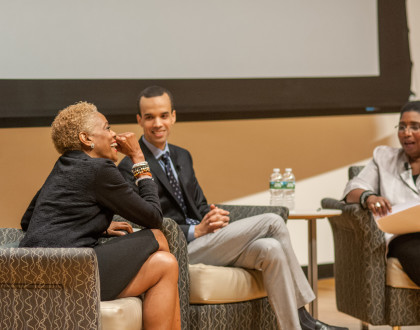5 takeaways from “The State of Race and the Way Forward”

Earlier today, YW Boston was proud to host nearly 200 Bostonians at a panel discussion marking Stand Against Racism 2016. Callie Crossley moderated the conversation with panelists Verna Myers and Michael Jeffries, who also fielded audience questions. Here are our top five takeaways from this inspiring and thought provoking event.
1. Race is a product of racism.
Jeffries stated that this is one of the first things he teaches students in his Wellesley College courses. This idea, which has also been presented by Ta-Nehisi Coates, is powerful in that it allows us to see that interpersonal racism and institutional racism are not binary, but that the former stems from the latter. We don’t need to wrestle with which is more important to address, because we simply must do both in order to see real change.
2. We need to interrupt bias.
In order to shift culture, we need to develop norms around interrupting bias. As Myers stated, “Interrupting bias is an art form. It starts with non-judgment. You want to interrupt it, not let it flow.” A key to doing this effectively is to name the concepts (e.g., bias, stereotyping) without labeling the person as a racist individual. Even if you can’t interrupt in the moment, try to connect with the person afterwards to explain the impact of the statement. In order to have these conversations effectively, Myers said, “We have to do more to become fluent in the language of inclusion.” While it is important to respect the feelings and humanity of everyone around us, we can’t use that as an excuse to stay silent. As Myers said, “There are some things we are no longer able to tolerate. We know better, we understand better, so we must do better.”
3. You can effectively respond to a charge of “political correctness.”
As the national discussion on racial justice gains momentum, we are seeing a trend of people in power using “political correctness” as an accusation. When political correctness is painted as the enemy to free speech, that charge can be used to silence and disempower advocates. As Jeffries observed, “We’ve completely lost the notion that there is a difference between free speech and further marginalizing people.” Politically correct speech is, at its core, correct. When confronted with a charge of being “too PC,” advocates can respond that using politically correct language is about allowing for self-definition and self-determination by groups that have been denied the public platform to do so. You can respond with the question Myers asked, “What’s wrong about taking into consideration the feelings of people who have been marginalized for years?”
4. When you are an ally, you are not in charge.
“You can’t be the leader of someone else’s movement,” said Myers. “Allies have to take direction and be willing to listen.” While many well-meaning White people may think they are helping the cause when they assume a leadership role in racial justice projects, as Myers said, “You cannot be a true ally when you stand and try to lead from and through your own privilege. It is still white supremacy when you take over a movement under the guise of being an ally.” Instead, allies need to be ready and willing to go where directed, to be deployed in the movement by leaders of color. One area in which allies can take the lead is in educating other White people about race and racism. “To be an ally, do the work around your own dinner table first,” said Jeffries. “One of the primary jobs of an ally is to do the work in the closed, separate, quiet spaces in their own communities.”
5. Organizational leaders must “walk the walk.”
In light of a recent Harvard Business Review study that shows female leaders and leaders of color are penalized for speaking up for diversity, it is even more critical that all leaders take on the charge of creating comprehensive institutional change for diversity and inclusion. “We need an organization shift that says this is everyone’s work now,” said Jeffries. Fighting racism is not “drive-by-diversity,” and should not be thought of as something that can be addressed through an event or a finite program, but as ongoing professional development. Further, those who move the work forward must be compensated for that effort. Leaders must be held accountable for improving diversity and inclusion in the organization, and need to demonstrate humility, courage, and vulnerability. As Myers said, “Courageous leadership is what’s required at this point. The status quo is resilient. This is a great time to be a leader; if you ever wanted to make a difference, it’s right now.”
Thank you to all who attended and our 150th Anniversary year sponsors who made this event possible.
Want to put these learnings into action in your school, organization, or neighborhood? Learn more about our Dialogues on Race and Ethnicity program and how it can help you.
